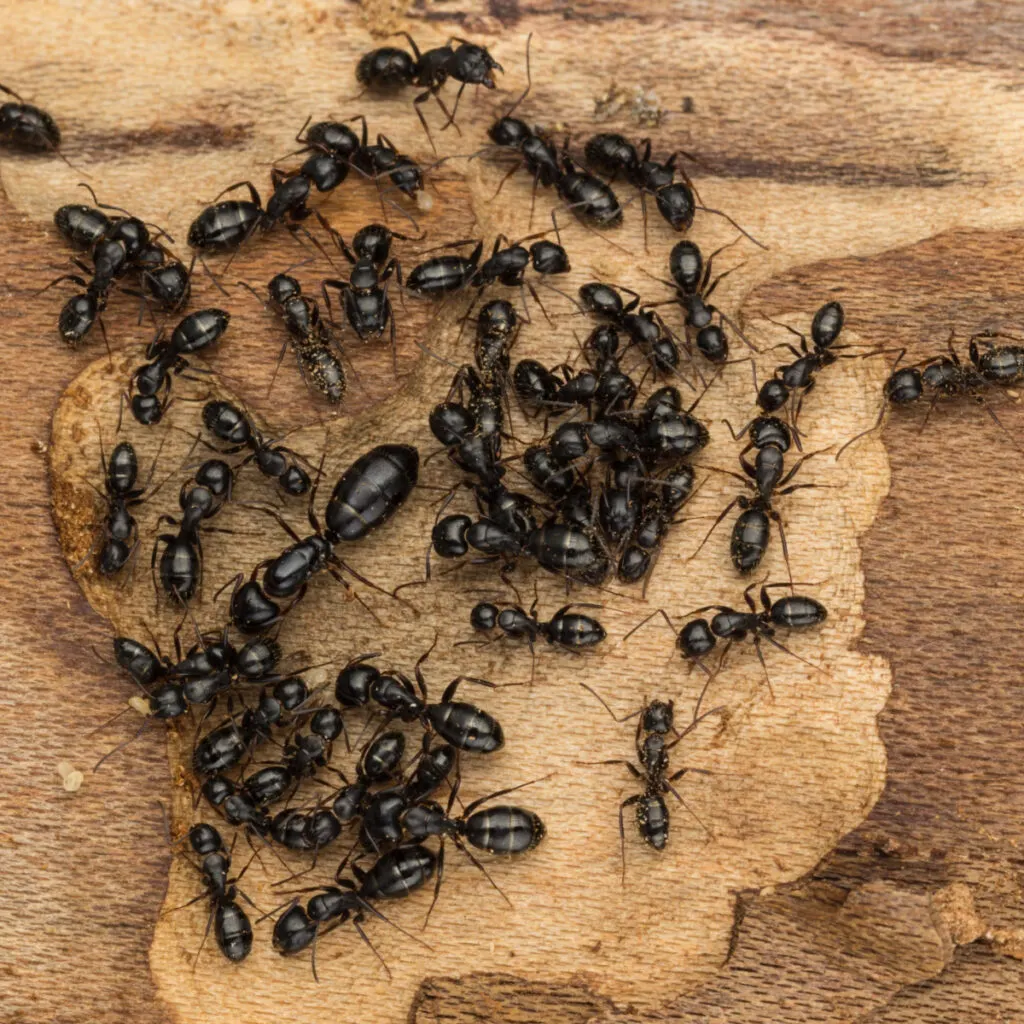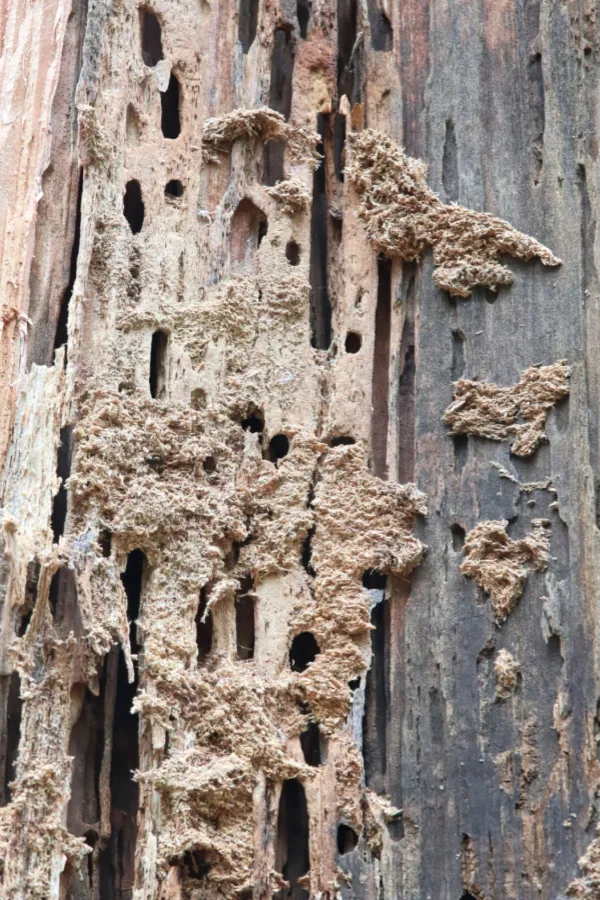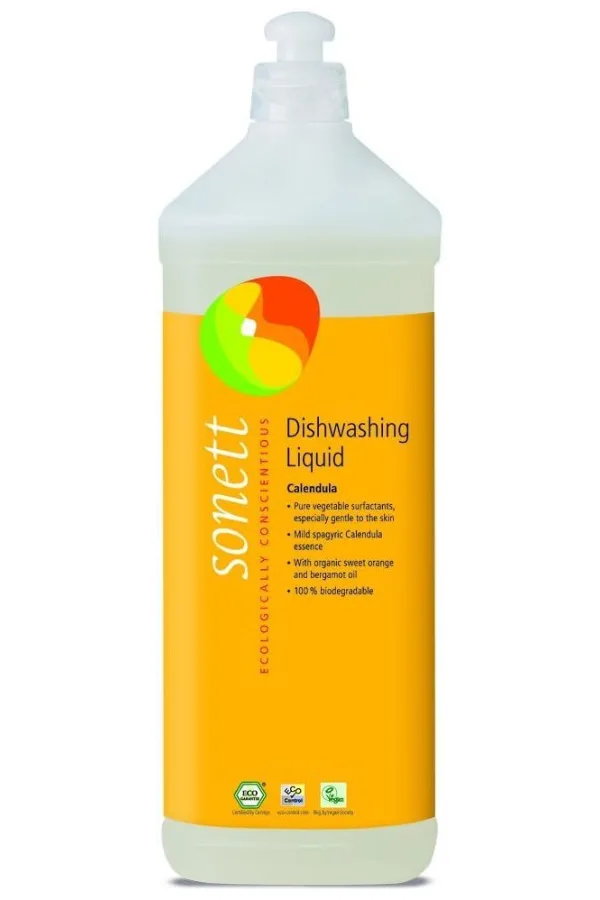Looking for a way to stop carpenter ants from damaging the wood in your home, shed, barn and other outbuildings – and do it naturally without having to resort to harsh and questionable chemicals?
Carpenter ants can wreak havoc on the wooden structures around your property. Unlike termites, they do not feast on wood but rather use the structure for developing a home and expanding their colony. And as their population increases, so does the damage to the wood around your home and landscape!
Although there are commercial powders and sprays on the market that can eliminate colonies, they can be a bit scary. Especially when using around children, pets and even adults.

But here’s the good news – there are actually quite a few effective, safe and 100% natural methods to control carpenter ants. And – they eliminate the need for using commercial products. Not only can they take care of carpenter ants and the damage they cause in short order, they can also save you considerable money in the process!
What Are Carpenter Ants?
Carpenter ants get their name from their incessant habit of building nests and carving tunnels in wooden structures. They do not intend to feast on the wood but merely use wooden structures to create nests and pathways.
They chew through the wood at an alarming rate, quickly turning it into a sawdust-like substance. In fact, one of the first hints that carpenter ants may be present is seeing piles of the wood remnant powder at the base of a structure.
In nature, carpenter ants serve a valuable purpose. They are an important part of the natural cycle of life, helping to break down and decay old trees and stumps into humus. But unfortunately, they also have an appetite for lumber. And around a home setting, that can cause serious trouble.

Unfortunately, the more and more they chew and build tunnels, the weaker it leaves the wood. If allowed to build long enough, they can completely destroy foundation beams, walls, trim and more. So much so that it can leave a building structurally dangerous over time.
How To Stop Carpenter Ants Naturally – 5 Simple & Safe Methods That Work!
First and foremost, it is important to control carpenter ants early on. The longer a colony is allowed to develop, the larger it will become and the more damage it will cause. In addition, the larger a colony becomes, the longer it can take to eradicate it
Inspect wood structures around your home often. Be especially careful to check down along foundations where carpenter ants like to find an easy entrance. Look for obvious signs of sawdust and ant activity – and when you see it, begin to treat the area immediately.
#1 Soap & Water Spray – How To Stop Carpenter Ants
Believe it or not, one of the easiest and most effective methods of all for eliminating carpenter ants is by using a basic mix of all-natural liquid soap and water. This safe solution is not a deterrent for carpenter ants, but instead a powerful insecticide that eliminates them.
Soap blocks a carpenter ants ability to receive oxygen and interferes with their respiratory system. And by simply mixing liquid soap with water and spraying the ants and affected area, you can usually eliminate an entire colony within a week to ten days.
To make, create your solution with 3 parts water to one part liquid soap. Mix thoroughly and use a hand help spray bottle to apply. Spray the entrance and any affected areas you can get to thoroughly. Apply so the entrance is saturated with the spray and not just slightly damp. Product Affiliate Link : Sonett Organic Dishwashing Liquid
Repeat spraying daily. It is best to spray the area in the evening as the sun goes down. Carpenter ants are most active at night, and usually come out just as the sun sets. By spraying at this point, you can have the best chance of getting the ants coming and going.
Within seven to ten days, you should notice a considerable reduction in the carpenter ant population. Recheck the area a week or so later to make sure the colony has been eliminated.
#2 Baking Soda & Powdered Sugar – How To Stop Carpenter Ants
Baking soda is highly toxic to carpenter ants and will kill them quickly when they ingest it. By itself, baking soda is not enticing to ants. However, when you mix it in with powdered sugar, which happens to be highly preferred, they will gladly consume the baking soda with it.
Mix up equal parts of powdered sugar and baking soda and place strategically at the entrance of the ant colony. If you cannot locate the entrance, place the mix where you see them traveling back and forth.
This method is especially effective for eliminating small colonies quickly. By eliminating the ants foraging, the colony usually dies out fairly fast.

#3 Diatomaceous Earth – How To Get Rid Of Carpenter Ants
Diatomaceous earth, or DE, is a 100% all-natural powder created from fossilized algae. The fossils are actually the remains of extremely small creatures that once lived in all ancient bodies of water. DE is actually effective against a long list of pests. See: How To Use DE To Battle Pests
Diatomaceous earth has sharp edges, which damage the exoskeleton of ants when they crawl over it. When it does, the ants dehydrate and perish.
To use DE effectively against carpenter ants, sprinkle it around their entrance and along any paths they travel. DE needs to be dry to be effective. Because of this, you will have to reapply any time it rains or when the powder becomes wet from dew or moisture.
#4 Vinegar – How To Stop Carpenter Ants
Vinegar can be an effective natural solution to all kinds of issues around the home – including getting rid of carpenter ants!
When sprayed around a nest and along the trails where carpenter ants work, vinegar eliminates the pheromone trails that ants use to navigate. In the absence of pheromone trails, ants can’t find their way around, which then disrupts food supply and population growth.

By mixing equal parts of store-bought (4% to 5% vinegar) with equal parts of water, you can spray areas where the carpenter ants have been working. It not only will confuse and deter carpenter ants, it can serve as protection for future attacks as well, keeping carpenter ants from directing others to your wood surfaces.
#5 Ground Cinnamon – How To Stop Carpenter Ants Naturally
Cinnamon works in two unique ways against all ants. First, ants detest the smell of cinnamon. They will usually try at all costs to avoid it. Because of that, by simply sprinkling a line of cinnamon in front of their colony, they won’t cross it either way. This eliminates food sources, and eventually, the colony.
However, if the ants do cross the line, the cinnamon dust they breathe will actually kill them. The dust is highly toxic to their respiratory system and leaves them unable to work and live in the colony.
How To Prevent Carpenter Ants
One of the best ways to stop carpenter ants is keep them from arriving in the first place! Carpenter ants love moist locations and wood. To help prevent carpenter ants:
- Ensure moisture sources like leaking pipes are fixed.
- Repair or replace wood that is damaged.
- Ensure wood piles aren’t stored out in the open.
- Add plants like peppermint, mint, and lavender around the edges of buildings – they repel ants as they do not like the scent.
Here is to stopping carpenter ants in their tracks, and keeping your home and structures safe from their damage!

Follow Our Facebook Page For Great Gardening Tips And Advice! This Is My Garden Facebook Page
This Is My Garden is a garden website created by gardeners, for gardeners. Jim and Mary Competti have been writing gardening, DIY and recipe articles and books and speaking for over 15 years from their 46 acre Ohio farm. They publish three articles every week, 52 weeks a year. Sign up today to follow via email, or follow along!

